The teacher who helped to propel Richard Burton to fame
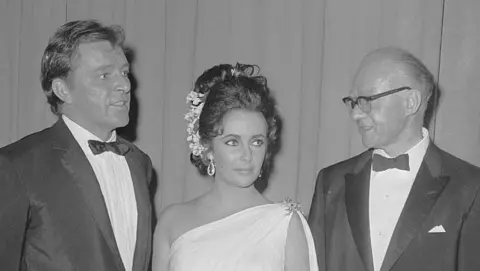 Getty Images
Getty ImagesRichard Burton was a global icon - famed for his powerful, baritone voice and passionate yet tumultuous relationship with fellow megastar Elizabeth Taylor.
But until now, few had ever heard of Philip Burton.
Philip was Richard's school teacher who spotted his potential, became his legal guardian, lent him his name and helped propel him to international stardom.
"It was a friendship built for the ages, an unlikely friendship," said Ed Talfan, a producer on new biopic Mr Burton, which was released in UK cinemas on Friday.
The film tells the story of Richard's difficult early life in Port Talbot, south Wales.
Philip, played by Toby Jones, is portrayed as a serious and cultured man who, alongside teaching English, writes and produces plays.
Scrappy young schoolboy Richard, played by Harry Lawtey, has ambitions to become an actor, so Philip teaches him to stand up straight and transforms his speaking voice by getting him to round his vowels, pronounce his consonants and project.
But in fact the two men's backgrounds were more similar than their demeanours ever suggested - and his role in Richard's life would prove to be transformative.
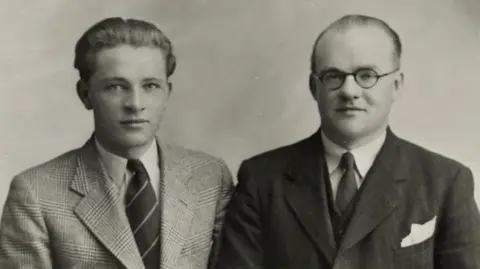 Richard Burton Archives
Richard Burton ArchivesPhilip grew up 30 miles (48km) from Richard in Mountain Ash, Rhondda Cynon Taf.
"Philip had a rather tragic and lonely childhood," said historian and Philip's biographer Prof Angela John, who acted as an informal consultant on the film.
"His father was killed in a pit accident when Philip was only 14... he wasn't that close to his mother and he'd been very close to his father."
Philip was an avid reader and theatre lover who won a scholarship to Cardiff University to read Maths when he was only 16.
"In a way he forged a whole new persona," said Angela.
"He had sort of ironed out his Welsh accent because unfortunately in those days, if you wanted to get on and if you wanted to be taken seriously in England... you had to sadly get rid of your accent."
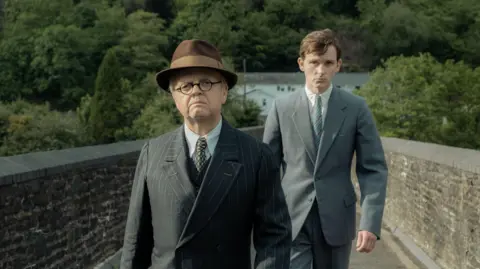 Copyright: Warren Orchard/Icon Film Distribution
Copyright: Warren Orchard/Icon Film DistributionRichard, born Richard Jenkins in 1925, was twenty years Philip's junior.
He would have been one of 13 children, but two died in infancy.
When Richard was two years old, his mother died from septicaemia after giving birth to a younger brother.
"He was a working-class young man growing up in, I think it's fair to say, abject poverty," said Ed.
Richard ended up living with his sister, her husband who was a miner, and their two young daughters.
"The outlook for him was really, really tough. If you're a betting person, you'd have just said, 'well he's going to end up down the mines or at the steelworks'," he said.
Angela, who has written Behind the Scenes: The Dramatic Lives of Philip Burton, said Richard's family was "large" and "caring".
"So even though his father had drink problems and there wasn't that much money around, they gave whatever they could," she added.
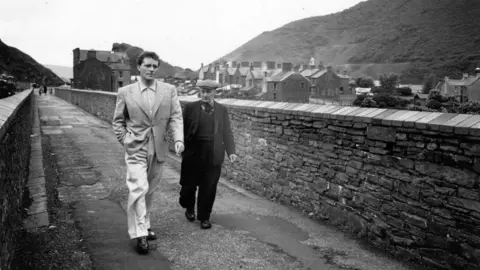 Getty Images
Getty ImagesRichard and Philip's relationship really began after Richard was forced to leave school at 16 to support his family by getting a job.
Philip, who had taught Richard at school, decided to step in.
"[Philip] was able, as a result of several key figures in Port Talbot... to get Richard back into school, which is a pretty unusual thing to return to school when you've left," said Angela.
With conditions somewhat cramped at his sister's home, Richard moved into the house of Ma Smith, where Philip was a lodger.
"And then from that point Richard was being trained, in effect daily, by Philip," said Angela.
Philip could not formally adopt Richard as he was 20 days short of being 21 years older than him so instead he became Richard's legal guardian, taking full responsibility for him, and then Richard Jenkins changed his name to Richard Burton.
"That happened for several reasons," explained Angela.
"It's an awful thing to say these days, but [Richard] would be in a better position to have a name like Burton, which was seen less as a sort of working-class Welsh name.
"Also, in effect Philip was taking responsibility for Richard and was already a well-respected person in the theatre world himself, so it gave Richard again a further opportunity."
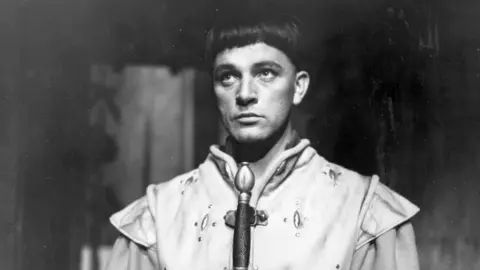 Getty Images
Getty ImagesIn the film, Richard's biological father, played by Steffan Rhodri, is suspicious of Philip's interest in his son, but happy to take a wad of cash in return for signing papers to hand over legal responsibility.
Previous biographies have gone further, suggesting Philip's interest in Richard was sexual.
"My take is perhaps rather different," said Angela.
"There is no evidence or proof whatsoever that there was any problem there or that Richard actually found it a problem.
"What I will say is that Philip was gay... much later in life when he lived in America he had one known long-term relationship, so I think in some instances this is people putting two and two together and making 25."
Ed was in agreement.
"The people I've spoken to and the people the team have spoken to who knew Richard and Philip personally, and from the vast majority of biographies, our takeaway is that Philip's motives were good, honest and pure," he said.
Richard's first acting break
Philip's connections gave Richard his acting break, according to Angela.
After building a reputation in the theatre, Richard made his screen debut in 1949 in The Last Days of Dolwyn.
He went on to be regarded by many as the finest actor ever to emerge from Wales, starring in films including Cleopatra and Who's Afraid of Virginia Woolf?
In 1960 he won a Tony Award for his performance as King Arthur in Camelot on Broadway. He was nominated seven times for an Oscar but never won.
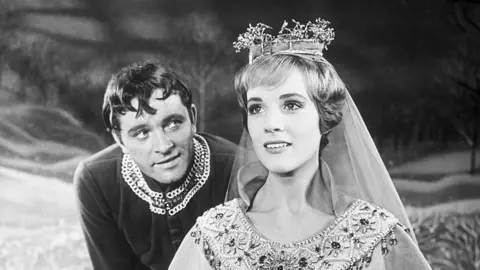 Getty Images
Getty ImagesRichard was married five times, twice consecutively to Elizabeth Taylor.
Meanwhile Philip went on to work on almost 200 radio programmes, producing work by Dylan Thomas.
He reinvented himself in the mid-1950s, moving to the US where he became the first director of the American Musical and Dramatic Academy in New York.
Richard and Philip remained close throughout their lives apart from a two-year period when they were not in contact.
"Philip wouldn't talk to Richard because he was so loyal to Sybil, Richard's first wife," said Angela.
She said it was Elizabeth Taylor who, despite having not met Philip at this point, reunited the pair.
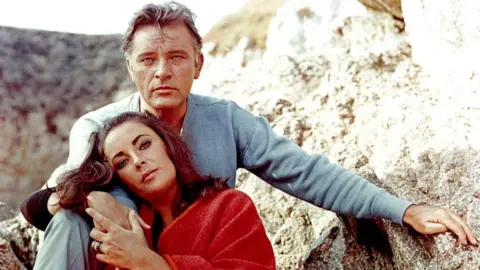 Getty Images
Getty Images"[Richard] was trying to get his head around the Gielgud production of Hamlet and was having some difficulties with it... so [Elizabeth] phoned [Philip] and asked him if he would come to help Richard," Angela said.
She said Philip and Elizabeth's friendship continued after Richard's death in 1984 from a cerebral haemorrhage.
"When Philip was dying, Elizabeth went to visit him in hospital in Florida and the nurse on the ward said she nearly fell over when she saw who the visitor was," said Angela.
Philip died in 1995, at the age of 90.
Ed believes the story of their relationship will resonate with many.
"It's almost a cliche that everybody remembers a great teacher, but it's cliche for a reason because you only need one in your life and it's transformative," he said.
Angela hopes the film will allow Philip to take his own place in history.
"It clearly helps to make Philip better known to the world, which I think he does deserve to be," she said.
"He deserves to be known in his own right because he actually was a remarkable man."
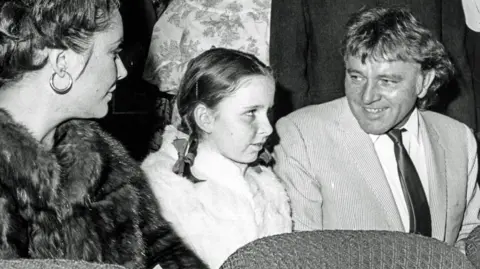 Universal History Archive | Getty Images
Universal History Archive | Getty ImagesRichard's daughter, Kate, said it was "very emotional" being on set and watching the "extraordinary" performances of the actors who portrayed her father and grandfather.
"Just seeing those two incredible actors play these two very important men in my life... it was the weirdest, strangest thing," she told BBC Radio 4's Today programme.
"I thought this is looking really wonderful and very authentic. That was the thing that was making me the most happy."
Mr Burton, produced by Severn Screen, BBC Wales and Ffilm Cymru Wales, is in UK cinemas from 4 April 2025.
